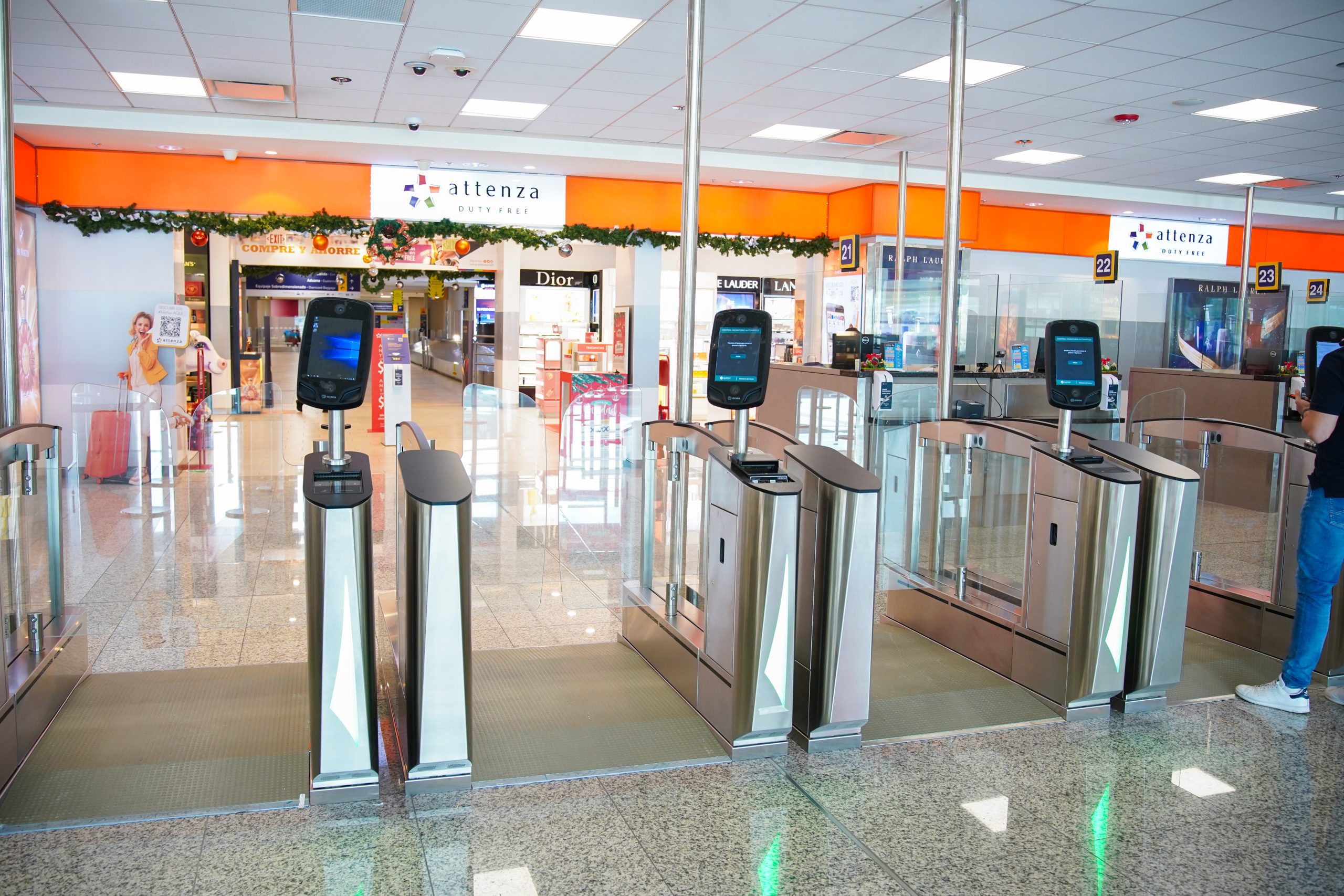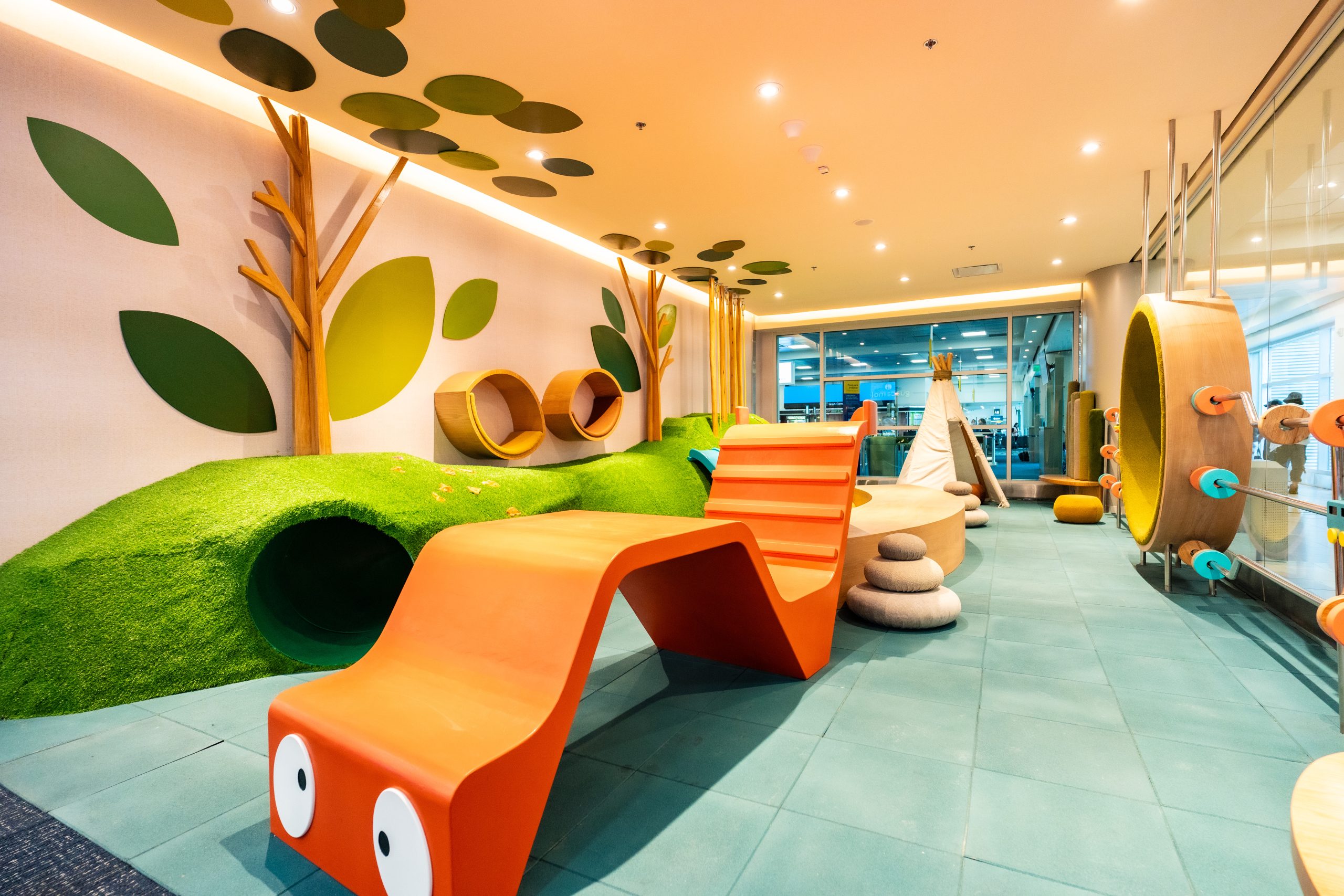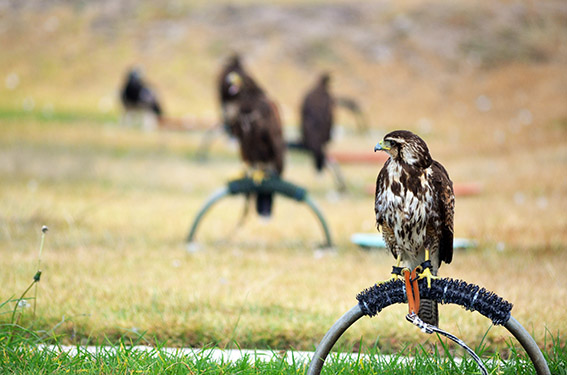Month: December 2023
Quito Airport, pioneer in the automation of airport processes that improve the passenger experience

The Mariscal Sucre International Airport becomes the first airport in Ecuador to implement automated solutions in airport processes. The project incorporates biometric systems for immigration control in international arrivals and boarding on Delta airline flights to the United States. It also includes automatic doors for access to security filters. This initiative is part of a technological transformation project at the Quito airport, aimed at enhancing efficiency, security and traveler experience.
Biometric doors in immigration arrival control.
Passengers with an Ecuadorian biometric passport (with chip) and who are over 18 years old can now use one of the 5 biometric doors that have been installed to carry out this process in a personal and automated way, which reduces service times from 1 minute 30 seconds to 45 seconds per person.
How does it work?
If eligible, passengers must approach to the biometric gate, scan their boarding pass and passport on the scanning screen, wait for data confirmation, and position for facial recognition. If everything is in order, the doors will open automatically, allowing the passenger to continue through the airport.
Since this implementation began in the testing phase on August 14, more than 11,000 passengers have taken advantage of these biometric doors, significantly improving waiting times.
Biometric doors for boarding on Delta flights to the United States
Two biometric gates, located in pre-boarding A10 and A12 gates, have transformed the boarding process for direct flights to the United States. This innovative system, initially operational only for Delta flights, uses advanced facial recognition technology that connects with the airline’s screening systems and links directly to the United States Customs and Border Protection. In this way, passengers only have to stand in front of the screen and, once facial recognition and data verification have been carried out, the door opens automatically to board the plane.
How does it work?
At boarding time, passengers approach to the biometric gate without assistance, avoiding the traditional scanning of the boarding pass and passport. Within seconds, facial recognition is complete, and the system instantly integrates with the airline and CBP system to verify passenger information. With successful verification and if there are no impediments, the door opens for the passenger to access the plane.
Access doors to the security filter area
The installation of automatic doors for access to security filters allows instant verification of the passenger’s boarding pass to speed up the process and go directly to the filters.
Ramón Miró, president and CEO of Quiport, the concessionaire company of the Quito airport, mentioned: “The implementation of biometric gates at the Quito airport is an innovation that automates three essential airport processes. “We are proud to be pioneers in the adoption of this cutting-edge technology in Ecuador, which reinforces our commitment of providing an excellent experience to our passengers.”
Great news for little travelers! Quito Airport reopens the children’s area.

The children’s area, located next to domestic pre-boarding area at the Mariscal Sucre International Airport passenger terminal, reopens its doors for the litter travelers, now with a renewed image after its closure due to the Covid-19 pandemic.
Aware of the importance to provide a safe and fun space for children, CorporaciónQuiport, the company in charge of managing the Quito airport, has decided to renew this area. The new design aims to create a magical and educational environment, inspired by the biodiversity and nature of Ecuador, without neglecting the security that this type of spaces must always maintain.
The children’s area has been carefully designed to offer little travelers the opportunity to explore and connect in a playful and sensory way with the natural environment. Various elements and textures that stimulate touch have been incorporated, imagination and learning. In addition, pieces-counting games that promote the development of mathematical skills have been installed, as well as climbing structures, tunnels and slides to encourage physical activity, contributing to the comprehensive development of children.
One of the novelties in this design is the inclusion of a small quiet space with dim lighting, designed especially for those children who prefer to enjoy a more relaxed and independent environment. It is a hut with comfortable seats, a space that offers moments of tranquility and rest within the play area.
The reopening and remodeling of this area for children demonstrates Quiport’scommitment to provide a complete and satisfactory travel experience for all passengers, including the little ones. Now, children will be able to enjoy a safe, fun and educational space while waiting for their flight, creating unforgettable memories from the beginning of their trip.
Faunaetus celebrates 10 years managingresponsibly wildlife at the Quito airport

We celebrate a decade of extraordinary contributions by Faunaetus in wildlife management at the Quito airport, as well as in the harmonious coexistence between the airport operation and wildlife.
We remember the arrival of Faunaetus in 2013, when the operation of the new Quito International airport began and the need to work responsibly with the surrounding fauna. We came from an airport in an urban area to one located in a totally different environment in the middle of terrestrial fauna and birds. Due to this, the best and most effective method to control the fauna was carefully analyzed according to the kind of animals that we would find in the airport area and its surroundings.
“Fortunately, among other specialized teams that applied, we met Faunaetus, the company that best suited the needs, with a team of four highly qualified people,” says Gabriela Landázuri, EHS manager of Quiport, who participated in the design of the fauna control model. Ruth Muñiz, who came from Spain and has a PhD in Biology, and an expert in birds of prey, Paúl Tufiño who has a master’s degree in Biology, and two falconers, one of them a biologist and the other a zootechnician, formed the ideal team to begin this delicate task and carry out the corresponding analyzes to adapt their methods to the needs of the airport. Thus, it was decided that the best alternative was to use falconry techniques, together with other activities to reduce the risk of fauna in airport operations.
At the beginning, Faunaetus brought 2 saker falcons and 6 Harris eagles from Germany, along with a border collie dog from Colombia. These animals, after being trained in musculature and adaptability to the environment, began their service together with a labrador dog that was in the country. In just two months, Faunaetus managed to implement a complete service that met the wildlife control objectives in the airport.
Birds of prey make flights to mark territory and prevent other species of birds from approaching areas where they represent a risk for the operation of aircraft, while dogs are in charge of turtle doves and other birds that perch on the ground, as well as terrestrial fauna that may approach sensitive areas of the airport. Over time, more birds and dogs were included in the team.
Through exhaustive analysis and practical experiences, Faunaetus and the Quiport EHS Department managed to change the initial objective of fauna control to more sustainable management. It was identified that certain species of birds do not represent a risk to airport operations and, therefore, measures were implemented to allow their permanence at the airport, of course, with regular controls and monitoring.
This initiative has led to a respectful coexistence between birds and airport operations, a unique achievement in the industry where it is generally sought to avoid the presence of birds in the vicinity of airports as they represent a risk in the operation.
Currently, the Quito airport has a team of 6 specialists who manage the fauna with the help of 10 Harris eagles, 3 peregrine falcons, 2 saker falcons and 4 border collie dogs, all contributing effectively to security and safety. responsible management of fauna in our environment.
We congratulate and appreciate the service and progress that Faunaetus has had during these 10 years!
